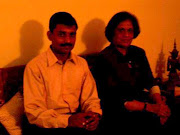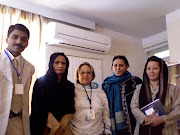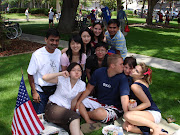That the current ruler of the People's Republic of China, Hu Jintao, is a bore will no doubt be a relief to most people, including 1.3 billion Chinese. Hu's dullness is remarkable given the high drama of China's fairly recent transformation from a poor, blood-soaked totalitarian country to a rich (in patches) superpower aspiring to take over America's lead in the not-so-distant future. But perhaps his lack of charisma is part of the point. The first 27 years of the People's Republic, under Chairman Mao, when millions died in almost constant purges and upheavals, and tens of millions died of starvation in bizarre economic experiments, were so awful that most Chinese are quite sick of charismatic leadership.
China is the only ancient civilization in human history to have reemerged as a major force in the world. And Chinese are rightly proud of this. So why rock the boat? It is better to be ruled by boring technocrats like Hu who will keep things nice and steady.
This is not the story one might hear from unemployed workers in the rust belts of northeastern China, or from rioting farmers in Guangdong province who have been pushed off the land by greedy developers working in tandem with corrupt party officials. Nor is this view necessarily shared by the brave lawyers willing to take on some of those corrupt officials, or intellectual dissidents who still get arrested for arguing that Chinese should be entitled to basic democratic rights.
But it is the common line taken by people who benefit most from the current wave of fun, fashion and prosperity -- the new urban elite, some of whom are pampered children of Communist Party bosses. None are communist ideologues. All have taken the late leader Deng Xiaoping's "To Get Rich is Glorious" slogan seriously. And not a few of them, now in their 40s, were among the Tiananmen Square demonstrators in 1989 who demanded democratic freedoms and an end to corruption.
One pokes into this contradiction at one's peril, especially if one is a foreigner. A prominent figure in the new Beijing elite, a highly sophisticated woman who personifies the glories of getting rich in today's China, also happens to be a daughter of the Communist aristocracy. Hong Huang is a round-faced, expensively dressed media mogul who runs a string of trendy magazines. Her mother was Mao's English teacher. Her stepfather was Mao's minister of foreign affairs. Hong was partly educated in New York, and one of her husbands was the filmmaker Chen Kaige, another player in Beijing's gilded age.
A few years ago, I was taken to Hong's lovely country house in the mountains. I had been introduced by a mutual friend, the avant-garde poet Yang Lian, who lives in London with his wife, Yo Yo, a novelist. Neither Yang Lian nor Yo Yo are, strictly speaking, political dissidents. They don't write about politics much, but they are free-spirited authors who chose not to put up with the restrictions of an authoritarian society.
The evening started off amicably, with gossip about acquaintances on the Beijing scene. Then Hong started giving Yang advice. Why was he still living abroad? Why didn't he come back home? Things were great in China now. Lots of money to be made. Yang should get with the program. All that modernist poetry might fool foreigners, but life had moved on in Beijing. He should do some advertising, or maybe pop lyrics. There was no need to worry about censorship and all that, if you knew how to play the game.
A certain edginess crept into the bracing mountain air. Hong's advice began to sound more like bullying. Tiananmen had not been mentioned, but it was the elephant in the room. It was one of the reasons Yang and Yo Yo opted for residence abroad. Suddenly, Hong brought it up, turning to me as well. "Tiananmen, Tiananmen," she said, "foreign journalists are always going on about Tiananmen. I think it's time to forget about all that. We should move on and feel proud of our country. Foreigners just use it to bad-mouth China."
I felt I had to say something, but I didn't feel like picking a fight as Hong's guest. So I put it to her that the Chinese still insist on remembering the Nanking massacre of 1937, when Japanese troops went on an orgy of rape, looting and murder in what was then the Chinese capital. Indeed, this terrible event is a central part of what is now called "patriotic education." Japanese nationalists, on the other hand, want young Japanese to forget about it because they feel that it is time to move on and that the young should feel proud of their country.
Of course, I had picked a fight. And I will never forget the way Hong -- charming, cosmopolitan, New York-educated -- turned into a ranting Red Guard, screaming abuse at me, at foreigners in general and at Yang Lian and Yo Yo for defending me. Clearly a very raw nerve had been touched.
Yes, what Hong said was true. People, especially educated people with a certain cosmopolitan style, were doing all right in post-1989 China. There was money to be made, a lot of money. Fashion was booming. And so on. But at a price. And that price is what Hong called "playing the game" -- knowing what subjects to avoid, how to trim your views, how to stay out of politics. Let the dull technocrats rule China with a velvet glove -- and an iron fist for those who refuse to play the game.
To opt for this is entirely understandable. Exile is tough. And who wants to go to prison? Besides, life really is sweet for those who have made enough money and the necessary compromises. But they are compromises.
Because most foreign journalists, businessmen, diplomats and academics tend to meet educated, privileged Chinese like Hong, most reports from China reflect their views: that soft authoritarianism is good for China; that the Chinese masses are not ready for democracy; that to give them the right to vote would only create chaos. But the main argument for technocracy, heard not just from the Chinese elites but increasingly in Western countries too, is that it is more efficient. Once the rulers put their minds to something -- the Olympic Games, birth control, economic reform, perhaps even tackling pollution -- nothing and no one stands in the way of success.
People who like the idea of strong central government and top-down change are often attracted to the Chinese model. And so are businessmen who would much rather deal with authoritarian party officials than independent trade unions. China is often favorably compared with India, with its gross inefficiencies, dire poverty and huge problems with illiteracy, corruption and organized crime. Messy democracy, it might seem, is holding India back, while China is forging ahead with ever more impressive statistics.
There is some truth to this view. When I first saw Shenzhen in the 1970s, it was a tiny village across the border from Hong Kong. Since Deng Xiaoping declared, in 1982, that a new economic zone should arise there, his will soon became reality. It is now an industrial metropolis with a population of, give or take, 10 million people.
Technocracy, however, has great drawbacks too. Authoritarian technocrats are not very good in emergencies. When a devastating earthquake hit Sichuan province in 2008, killing about 70,000 people and leaving 10 million more without homes, China was much praised for its speedy and compassionate response. What has been mentioned less is that a disproportionate number of victims were children because schools collapsed. Developers had used shoddy materials and paid officials to look the other way.
Perhaps one cannot blame the technocrats in Beijing for this. But the central government should not be praised too highly either. Much of the early help came from ordinary Chinese who sped to the scene, and they were actually hindered by officials in the beginning. Later, when citizens, helped by lawyers, tried to investigate the corrupt practices that had led to the catastrophic number of children's deaths, they were blocked and, in some cases, sent to prison.
The other thing government-by-experts is singularly bad at doing goes to the heart of politics: solving conflicts of interest. Individual liberties have increased without the benefits of political liberties. The state will no longer decide whom a person can marry, where he can live, what kind of job he can seek. But any effort to further collective aims in an organized fashion independent from the state will be ruthlessly crushed. This leads to what old-fashioned Marxists called contradictions. What is good for the business elite of Shanghai may not be good for the peasants in Sichuan.
To justify its monopoly on power, the Chinese technocracy relies on the promise of order and constant economic growth, and the claim of patriotism. Supporting the government is patriotic, and criticism is unpatriotic or, if voiced by foreigners, "anti-Chinese."
But in the end, the greatest flaw in the system is that China's boring rulers are self-perpetuating. They cannot be punished by the ruled for their incompetence. Great blunders go unchecked. Conflicts of interest fester or erupt in violence. China's technocracy might well look stable and successful for a while to come, but it is unlikely to last without basic political reform. Some think the new wave of technocrats, the ones who went to Harvard or Yale, can bring this about themselves. One never knows. But as long as they haven't, I'd still put my money on messy democracy any day.
Ian Buruma is a professor of human rights at Bard College and the author of, most recently, "The China Lover."
Sunday, October 11, 2009
Subscribe to:
Post Comments (Atom)












No comments:
Post a Comment